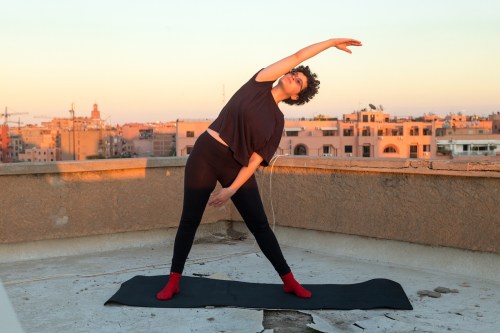If you’re not familiar, IBS is short for irritable bowel syndrome, which is a pretty commonplace issue that a lot of people tend to deal with. “Irritable bowel syndrome is defined by abdominal pain associated with bowel motions,” says David Prichard, MB, BCh, PhD, a gastroenterologist. “Individuals with IBS can experience diarrhea, constipation, or a mixture of both.” So yeah, the not-so-pleasant symptoms include many of the things that you’ll hear in the Pepto Bismol commercials—and it’s a chronic condition that takes long-term managing.
But here’s the thing—it’s not like those afflicted with IBS are just going to skimp on their wellness regimens. At the same time, you’d think that the up-and-down, hard-hitting moves of, say, a boot camp would not be very comfortable on an irritated gut. But, good news: You can certainly still exercise with IBS.
“Studies show that exercise can help people with IBS, in addition to promoting overall health and reducing stress,” says Niket Sonpal, MD, a New York City-based internist and gastroenterologist and teaching faculty member at Touro College of Medicine. “Research published in the American Journal of Gastroenterology has shown that people with IBS who exercise regularly have less severe symptoms compared to those who don’t exercise—so these findings suggest that regularly exercising will help to decrease the severity of IBS.”
“Findings suggest that regularly exercising will help to decrease the severity of IBS.” —Niket Sonpal, MD
Dr. Prichard agrees, noting that most people’s IBS doesn’t limit their ability to exercise. “In moderation, exercise is unlikely to cause or exacerbate the symptoms of IBS,” he says. “In fact, moderate exercise may reduce symptom severity and improve bowel habits.”
On the other end of the spectrum, though, really intense exercise can be rough on the condition. “Extreme exercise like marathon running or Iron Man events can cause symptoms similar to IBS,” says Dr. Prichard. According to Dr. Sonpal, “skip exercises that rattle the body such as jumping rope, running, soccer, basketball, and volleyball.” So maybe avoid burpees and other high-intensity stuff if you’re worried about a flare-up.
The more gut-friendly fitness regimens to follow include much more moderate modalities. “I suggest brisk walking over running because the high impact of running can upset the GI tract,” says Dr. Sonpal. “Gentle yoga is also a very good choice for those with IBS, as well as low intensity bike rides, Pilates, and swimming. A home-based gym is also a good idea for those who need to take frequent restroom breaks.”
This way, you’ll still reap the benefits of exercise—which can help with improved sleep, energy, and physical functioning, according to Dr. Prichard. “Stress is known to be one of the causes of IBS, too—and people with IBS are more sensitive to stress-induced abdominal symptoms,” says Dr. Sonpal. “Exercise is helpful in raising endorphins and decreasing stress, which can mean reduced IBS—and working out helps the digestive system to function better.”
That said, here are the doctor-approved tips to working out with IBS:
1. “Don’t drink that morning hot coffee or cup of tea,” says Dr. Sonpal. “Caffeine and hot drinks can cause contractions in the stomach.”2. “Don’t consume gas-causing food prior to exercise,” he says.3. “Time your workouts to coincide with when your intestines are calmer and quieter,” says Dr. Sonpal.4. “Avoid eating two hours before working out,” he says. “Scheduling a workout in the morning might be a good idea so you don’t face hunger pangs.”
Similarly, here’s how exercise can cause bloating (yes, really). But here’s how to do a Nauli Hatha yoga breathing practice to supercharge your digestion.
Sign Up for Our Daily Newsletter
Get all the latest in wellness, trends, food, fitness, beauty, and more delivered right to your inbox.
Got it, you've been added to our email list.











